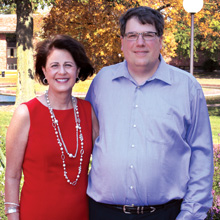Gift in Your Will or Living Trust
Deepen Your Connections
Through a will or living trust, you can give to Central College knowing you have flexibility and support when you need it.
It's quick and easy to complete your gift. And doing so will help open doors that enrich all aspects of Central for years to come.
In as little as one sentence, you can include a gift to Central College in your will or living trust. This type of donation will help change the lives of future generations of Central College students for years to come.
Watch How It WorksSee How It Works
Why Put Central College in Your Will?

Our first impression of Central College was when our son, Justin, Class of 2006, enrolled as a freshman. Through the eyes of our son, we learned very quickly the value of a Central College education. We were extremely impressed by the rigorous academic courses, the quality of professors and the integrity of the coaches. We started to notice that Central develops the whole student: mind, body and spirit.
One Central parent told us: "What does a Central graduate have on either side of him when he graduates? A professor." Of course, when Justin graduated, there were two of his favorite professors standing there!
Along with academics and athletics, there was another component to a Central education: service. The college's emphasis on service significantly impacted Justin. He developed a commitment that follows him to this day.
During Justin's time at Central and still today, we have come to know and appreciate how special the Central family is — the talented faculty, administration, staff and students we feel fortunate to call friends.
So, why did we include Central in our will? To give back to a college that has given so much to our family and ensure that many generations have the opportunities of a Central education.
—Joel and Shayla From
Fund Your Donation With:
Not Sure How to Begin Planning?
Create a secure plan for you and your loved ones with our FREE Personal Estate Planning Kit.
Download My KitGifts That Pay
Your payments depend on your age at the time of the donation. If you are younger than 60, we recommend that you learn more about your options and download this FREE guide Plan for Retirement With a Deferred Gift Annuity.
Information contained herein was accurate at the time of posting. The information on this website is not intended as legal or tax advice. For such advice, please consult an attorney or tax advisor. Figures cited in any examples are for illustrative purposes only. References to tax rates include federal taxes only and are subject to change. State law may further impact your individual results. California residents: Annuities are subject to regulation by the State of California. Payments under such agreements, however, are not protected or otherwise guaranteed by any government agency or the California Life and Health Insurance Guarantee Association. Oklahoma residents: A charitable gift annuity is not regulated by the Oklahoma Insurance Department and is not protected by a guaranty association affiliated with the Oklahoma Insurance Department. South Dakota residents: Charitable gift annuities are not regulated by and are not under the jurisdiction of the South Dakota Division of Insurance.